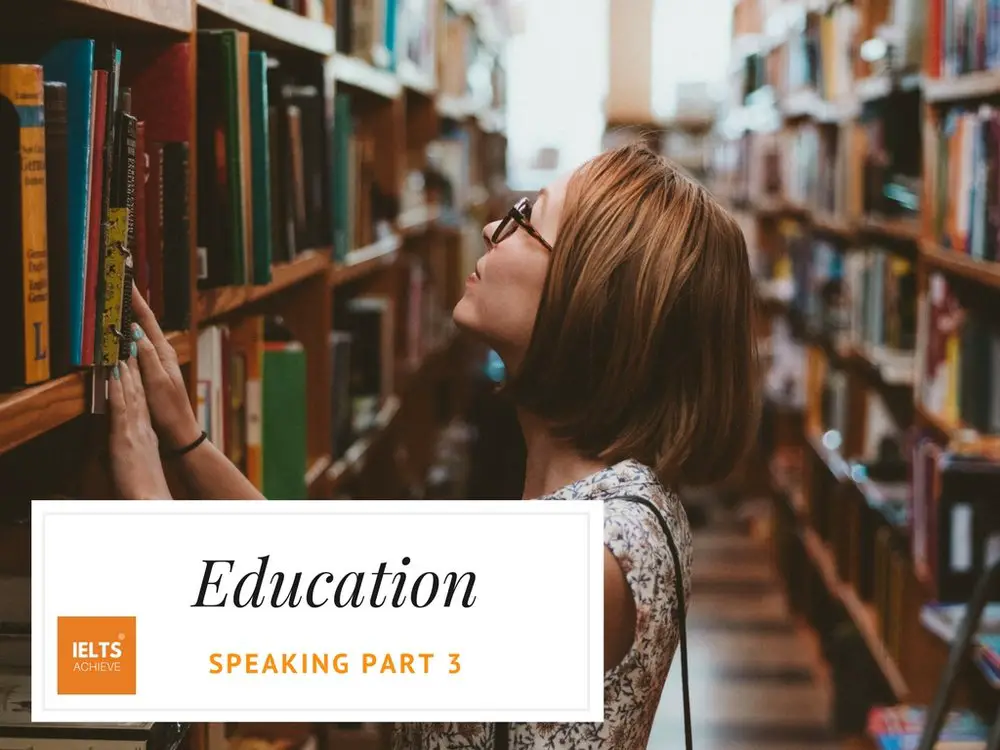
In this post, you will see one of the most common IELTS speaking topics for part 3 (Education) and sample answers.
Explore Various IELTS Speaking Part 2 Cue Card Questions and Answers.
Please remember that in the actual test you should give honest answers and talk about your own experiences, thoughts, feelings and opinions. Do not try to memorise answers, as the examiners will probably be able to guess and you will lose marks.
However, you are able to make up information to extend your answers, but be sure that you are confident when speaking about the chosen topic and that it is believable.
TIP >> Listen to the questions the examiner asks you and think about the structure of the question. Are they asking your for your opinion? or to say how something has changed from the past to the present?
TIP >> Learn about the most commonly asked question types used in the part 3 questions. This will help you to identify how you should respond and what to look out for when you are practising.
TIP >> It is common for many people to say ‘I don’t know’ or to lose focus when they get a question they know little about. Always answer the questions and if you feel as though you don’t know about the topic, then buy yourself some time by saying; ‘I haven’t really thought about that before…. but in my opinion……’ then give your opinion, etc.
TIP >> Don’t try to answer the questions as quickly as possible, take your time and answer them to the best of your ability. Give your opinion, the reasoning behind it and support with specific examples.
Take a look at the questions and sample answers below on the topic of ‘Education‘ >>
Q: Is higher education too expensive in your country?
A: I think that it is very costly to go into higher education in my country. They recently hiked the prices up, making it extremely difficult for most people to afford it. On the one hand, spending thousands on an education is worth every penny, but on the other hand, it can bring years of debt to a student and their family. In today’s society, no one is guaranteed to get a good job straight after university, so these course fee debts often continue to follow people around for life.
Q: Should all students pay for their university education?
A: In my view, many students should be entitled to have a free higher education, especially if they can’t afford the fees but have consistent high grades. For those who are high achievers getting a paid tuition to the university of their choice could be life-changing. For example in many countries in Europe, they offer free higher education to those who obtain high grades in high school, which encourages them to develop their learning and progress into a good profession.
Q: What advantages do universities bring to society?
A: I think that there are many positive things that universities can offer the communities around them. They bring students into the area for one, which means housing will be in demand. They will spend money on food, go out and books for their course, making the town or city a buzzing hub of student life. For the students they benefit from having a high level of education, which can then be translated into skills in the workplace, keeping society going with their knowledge.
Q: Which is more important, research or teaching?
A: I think that for those who prefer to research, they enter programmes for further education, like completing a Master’s degree or a PhD. This can develop a further understanding of a subject and allow the person to develop their research skills. Many people who complete these higher levels of education, also teach as a way of sharing their knowledge and gaining respect from their peers. You can’t really teach at that level without undertaking some sort of extensive research, therefore I see them of equal importance.
Q: How should students spend their summer vacations?
A: In my opinion, I think that students should spend some time relaxing during the summer break but should also continue to study and read. A better way to make use of all of that time off is to get an internship or other work experience that will be useful for their CV. They could also have a paid part-time job so that they can save money for the forthcoming school year. When completing a degree, it is really useful to gain experience from internships, save money and continue to study. Making the most of all of that free time is important. Being idle during that time period is not really going to help them to go anywhere in the future.
To practice with past questions, please look at Speaking Part 2 in more detail.
We hope you found this post useful in helping you to study for the IELTS Test. If you have any questions please let us know in the comments below or on the Facebook page.
The best way to keep up to date with posts like this is to like us on Facebook, then follow us on Instagram and Pinterest.
If you need help preparing for the IELTS Test, join the IELTS Achieve Academy and see how we can assist you to achieve your desired band score. We offer an essay correction service, mock exams and online courses.

